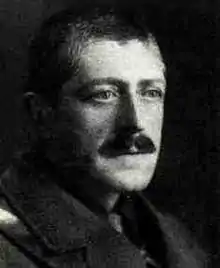1923 Yeovil by-election
The Yeovil by-election, 1923 was a parliamentary by-election for the British House of Commons constituency of Yeovil on 30 October 1923.
| |||||||||||||||||||||
| |||||||||||||||||||||
| |||||||||||||||||||||
Vacancy
The by-election was caused by the death of the sitting Unionist MP, Lt-Col. Hon. Aubrey Herbert on 26 September 1923. He had been MP here since winning the 1911 South Somerset by-election.
Election history
Before Herbert won South Somerset in 1911, the seat had been Liberal since it was created in 1885. At the 1918 general election, he easily won Yeovil in a three cornered contest, thanks to the Coalition coupon. At that election, the Labour candidate, William Kelly finished second, well ahead of the Liberal. The Liberals did not run a candidate at the following General Election, at which Herbert easily defeated Kelly. The result at the last General election was

| Party | Candidate | Votes | % | ±% | |
|---|---|---|---|---|---|
| Unionist | Aubrey Herbert | 15,468 | 61.8 | ||
| Labour | William Kelly | 9,581 | 38.3 | ||
| Majority | 5,887 | 23.5 | |||
| Turnout | 25,049 | 73.0 | |||
| Unionist hold | Swing | ||||
Candidates
48-year-old Maj. George Davies was chosen by the Yeovil Unionists to defend the seat. He was born in Honolulu in Hawaii. He was educated at Uppingham School and then at King's College, Cambridge. During the First World War, he served in The Gloucestershire Regiment.[2]
The Yeovil Constituency Labour Party once again selected 49-year-old William Kelly. He was contesting Yeovil for the third time. He was a Manchester educated Engineer and Trade Union Officer.[3]
The Yeovil Liberal Association selected as candidate, 44-year-old Lt-Col. Charles Waley Cohen. He was a Barrister who served in the Army from 1915 to 1921. He was Mentioned in dispatches, awarded the CMG and the Légion d’honneur.[4]
Campaign
Polling Day was set for 30 October 1923, thirty four days after the death of Herbert.
Result
On a turnout well up on the last General Election, Davies comfortably held the seat for the Unionists. The strong Liberal poll was the feature of the result. The Liberal intervention had marginally damaged the Unionists more than Labour.
| Party | Candidate | Votes | % | ±% | |
|---|---|---|---|---|---|
| Unionist | George Davies | 13,205 | 46.6 | -15.2 | |
| Labour | William Kelly | 8,140 | 28.7 | -9.6 | |
| Liberal | Charles Waley Cohen | 7,024 | 24.8 | New | |
| Majority | 5,065 | 17.9 | -5.7 | ||
| Turnout | 28,369 | 80.8 | +7.8 | ||
| Unionist hold | Swing | -2.8 | |||
Aftermath
Davies held the seat at the following General Election, and went on to hold the seat until retirement in 1945. Kelly had one last attempt at Yeovil but finished a poor third. He then sought election elsewhere and was returned at Rochdale in 1924. The Liberal improvement at the by-election continued as they established themselves as the main challenger to the Unionists locally. Cohen fought the seat a further two occasions without success, before contesting Portsmouth Central in 1929. The result at the following General election;
| Party | Candidate | Votes | % | ±% | |
|---|---|---|---|---|---|
| Unionist | George Davies | 12,690 | 44.5 | -2.1 | |
| Liberal | Charles Waley Cohen | 10,715 | 37.6 | +12.8 | |
| Labour | William Kelly | 5,080 | 17.8 | -10.9 | |
| Majority | 1,975 | 6.9 | -11.0 | ||
| Turnout | 28,485 | ||||
| Unionist hold | Swing | -7.5 | |||
References
- F W S Craig, British Parliamentary Election Results 1918–1949; Political Reference Publications, Glasgow 1949
- http://www.ukwhoswho.com
- http://www.ukwhoswho.com
- http://www.ukwhoswho.com
- F W S Craig, British Parliamentary Election Results 1918–1949; Political Reference Publications, Glasgow 1949
- F W S Craig, British Parliamentary Election Results 1918–1949; Political Reference Publications, Glasgow 1949
See also
- List of United Kingdom by-elections
- United Kingdom by-election records


